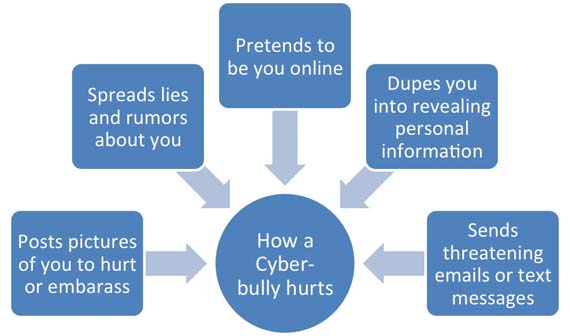Protect Yourself from Cyberbullying
What child doesn’t have a mobile device or gadget these days? It is 2014 and a lot of children are able to stay online for longer periods of time than before. Granted the internet is essential for children to get educational information and also communicate with other friends and family members, but we cant overlook the fact that cyber bullying exists.
Cyberbullying, according to the Oxford Dictionary, is ‘the use of electronic communication to bully a person, typically by sending messages of an intimidating or threatening nature”. It can happen via text messages, social media, emails and even phone calls.

The effects of cyberbullying can be very devastating to children if not handled properly. Some signs that your child is being harassed are:
- He/she may look nervous when using their devices online
- They may seem withdrawn
- They may avoid you seeing what’s on their screen when you enter their room
- They may be nervous about you handling their gadgets
- A drop in academic performances
- Looks depressed a lot of the time after using their mobile devices
There may be other reasons for these signs so don’t always rush to conclude it’s from cyberbullying but these are some of the major signs.
The Zambia Information and Communications Technological, ZICTA has outlined of some ways to protect yourself from cyberbullying which are:
1. Protect yourself from upsetting or distressing content. Do not knowingly access or share links to such sites. If you see something that bothers you, talk about this with your parents or someone you trust.
2. Ignore bad behavior and leave unpleasant conversations or sites with inappropriate content. As in real life there are people who for some reason, may behave aggressively, insultingly or provocatively towards others, or who want to share harmful content. Usually it is better just to ignore them and then block them.
3. Block anyone approaching you using rude, intruding or threatening emails or comments. Even if the message may be upsetting and makes you feel uncomfortable you should save it so you can show it to an adult for advice if needed. You are not the one to be ashamed of the
content of the messages.
4. Always be alert if someone, especially a stranger, wants to talk to you about sex. Remember that you can never be sure of the true identity or the intentions of that person. Approaching a child or a young person in a sexual way is always a serious cause for concern and you should tell a trusted adult, so you or the trusted adult can report it.
5. If you have been lured or tricked by someone into engaging in sexual activities or transmitting sexual images of yourself, you should always tell a trusted adult/police in order to receive advice and help. No adult has a right to request things of that particular nature from a child or a young person – the responsibility always lies with the adult!

Stay alert and report any cases of cyberbullying that you or your child may encounter to the relevant authorities. Read more about child online protection here.
Picture credits: HelpGuide, WestCork Times, Respectu




